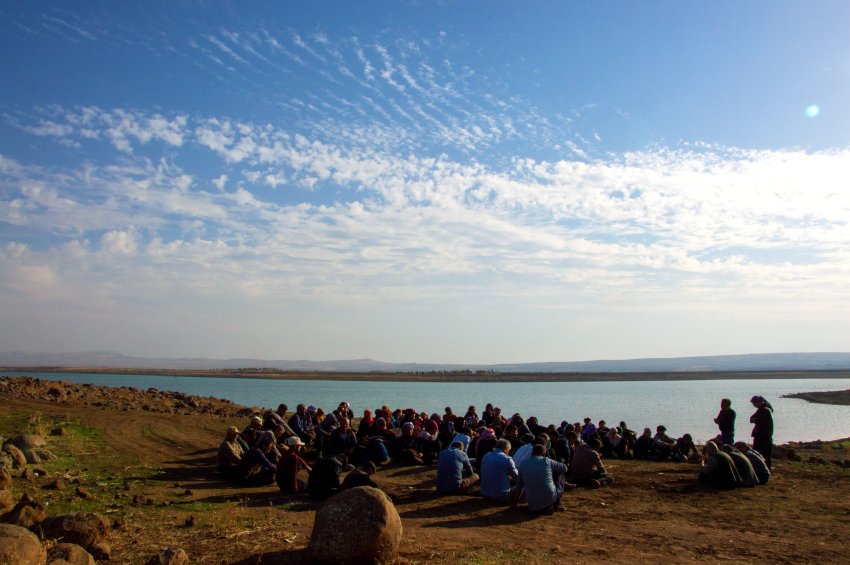
The revolutionary process in Rojava in North East Syria (also known as the Democratic Autonomous Administration of Northern and Eastern Syria, DAANES), based on the pillars of grassroots democracy, women’s liberation and social-ecology, is progressing. At the same time the Turkish state is threatening it with continuous war, killing of civilians and political representatives, planned ecocide and attacks on basic civil infrastructure.
Rojava is one of the four parts in which Kurdistan has been divided across Turkey, Iran, Iraq and Syria.
The history of Kurdistan, the people’s ecological way of life, the attacks’ effects and the methods of resistance, are intrinsically related.
1403 - Kocetera cr MRGA.png
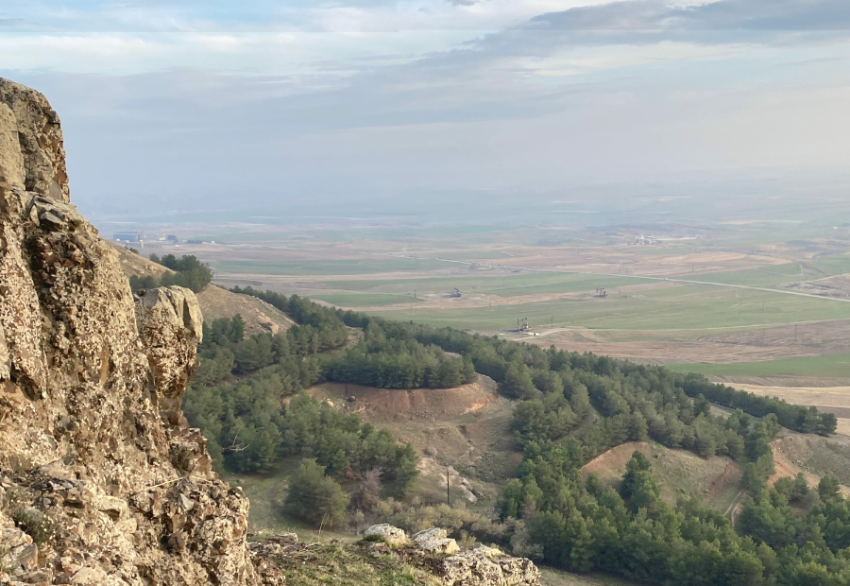
Koçerata
In the Koçerata region, the people and civil infrastructures in particular, were heavily targeted by Turkish airstrikes over winter (December-February) 2023‒24.
Koçerata, which means the “Land of the Nomads”, is a plain and, due to the Tigris river, very fertile. For hundreds of years Kurdish nomads have moved around the region, until the construction of nation-state borders following World War II.
Not being willing to give up on their ancestors’ way of life, many people continued to move around the plain until the creation of the Syrian state in 1945. This imposed monoculture practices and pushed the region toward intense urbanisation and industrialisation. Koçerata is rich in oil deposits and became one of the main pillars of energy supply for the region.
Rûken Şêxo, from the village Girê Sor told us: “The life of the people from the region is very simple and beautiful. We don’t need a lot from the outside. In every house you will find a small garden, where the families are growing vegetables, herbs and plants. Some also raise cows, chickens and turkeys.
“We make things ourselves, especially yogurt, cheese and milk. From our childhood onward we learned to create everything by ourselves, from the things we have. This is also what we are going to teach to our children.”
Today the people of Koçerata are living mostly in villages, organising their life as a part of the self-administration of North-East Syria. Connecting heritage and local culture with grassroots democracy and popular self-defense, the people of the region have set strong foundations for developing social-ecology.
action_of_human_shield_in_siwedi_december_2023_cr_diclefm.jpg
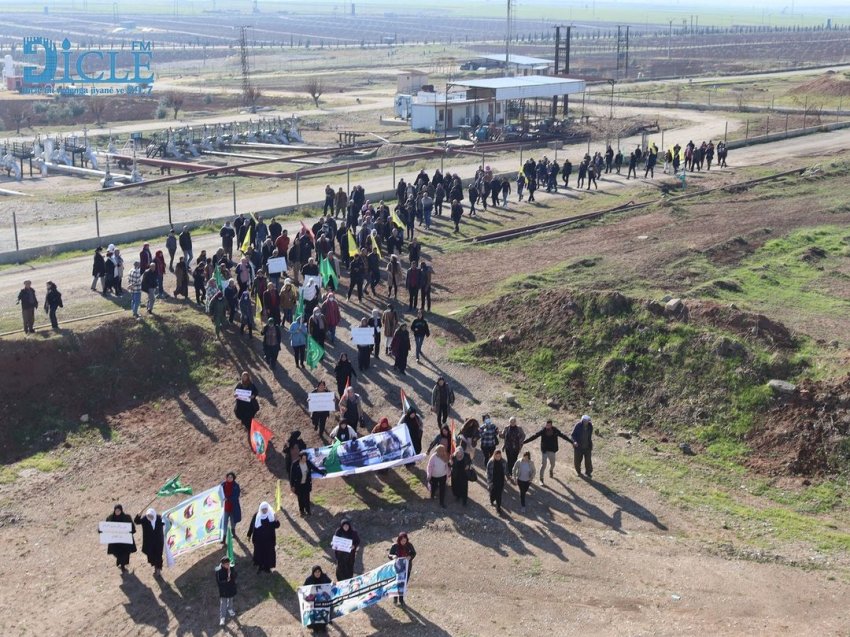
Turkey’s war against Rojava: An attack on the development of social-ecology
The Turkish state heavily attacked water and electricity infrastructure in the region in November 2022. However, the most recent bombardments, from October 6, 2023 to January 18, 2024, mark the worst escalation since 2019.
The Turkish army carried out more than 650 airstrikes during these latest attacks, killing 56 people, including children, and injuring 75. Essential infrastructure has been attacked, such as water stations, electricity plants, sites for cooking gas and oil, schools, hospitals, factories, industrial sites, agricultural and food production facilities, storage centers and medical facilities.
These attacks also aim to harm society’s psychological status and destabilise the region, in order to stop the democratic process that is going on within the Autonomous Administration.
One of the most critical pieces of infrastructure targeted was the Siwedî electricity plant.
“Being the main gas and power station of whole of North-East Syria, when there are problems within the plant it affects the whole region,” Rûken Şexo told us.
“After that shelling, four to five million people have been affected" with lack of or shortages of electricity and water. Turkey had already cut the water supply, so the situation was already very difficult. “The shellings are hurting the people of Koçerata, in all aspects of life,” said Xoşnav Hesen from the village of Girê Kendal.
“Most of the people live from the products of the earth and the animals that they raise themselves,” said Rûken Şexo. “Without water, the plants are dying and the animals can not drink. Agriculture and animal life are affected. The base of people and families’ economy are based on this.”
403 - picture_4_-_result_of_the_attacks_on_a_oil_facility_cr_hawar_news_agency.jpeg
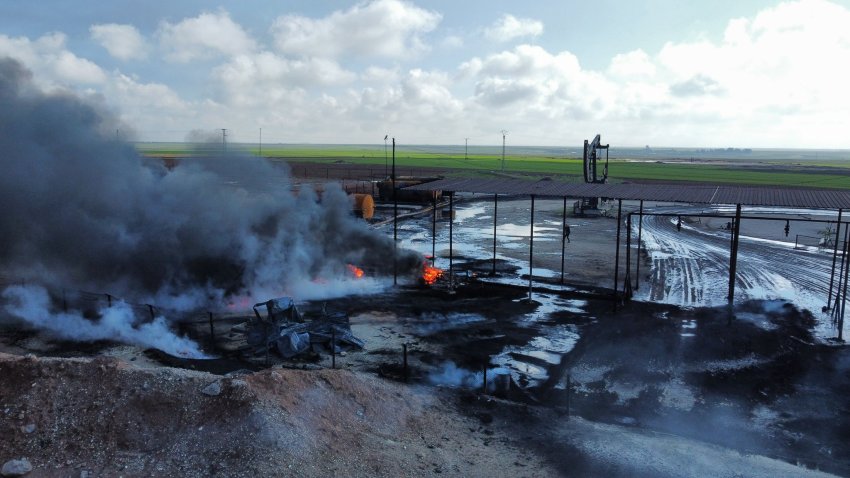
‘We don’t leave our land, we organise ourselves’
The perspective of the Autonomous Administration is based on the development of agro-ecological practices, eco-industry, a system of cooperatives and a circular approach to production and consumption.
In this framework, central elements are initiative from the base, self-organisation, and decentralisation.
Plans are made regarding the use of different sources of energy, such as solar, biogas from animal manure and organic wastes or wind energy, the recovery of the soil and groundwater characteristics, and the production of organic fertilisers. However, these could not be developed on a large scale due to the systematic destruction of basic infrastructure.
The attacks have forced the administration and the region’s economy to be devoted towards continuous works of reparation and rebuilding, in order to reply to emergency and immediate consequences of the war.
The embargo also represents another significant obstacle to the development of ecological projects.
403 - map_of_ne_syria.jpeg
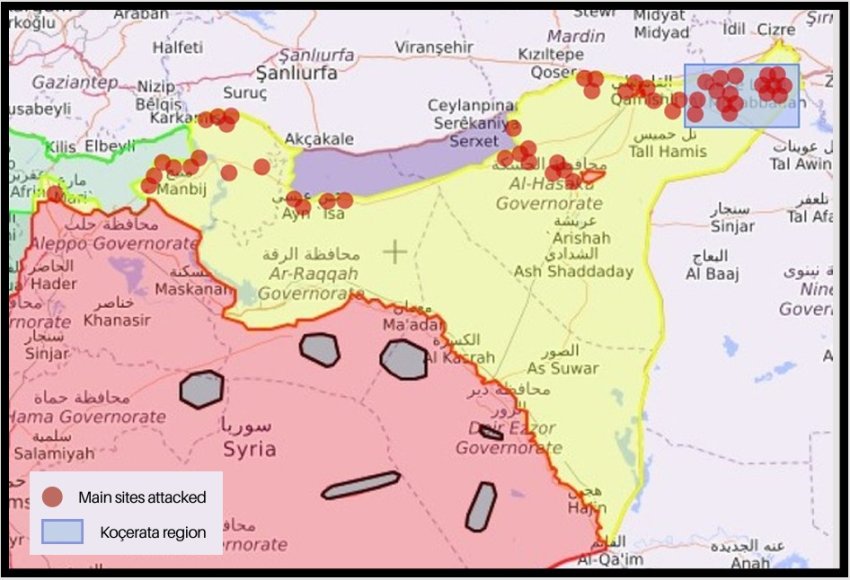
Resistance, resilience, solidarity
Despite all these hardships, people are showing strong solidarity and determination to stay on their lands. The municipality visits different communities to inform them, discuss, listen to their needs, try to find solutions and organise collectively.
The people of Koçerata pull their resources in times of difficulty. Neighbours share generators and water pumps, and collect funds. Some villages limit their electricity in order to share it with others. In December, the community created a human shield to protect the Siwedî power plant from further attacks.
The ecological crisis and the increase in global conflicts, often for the sake of natural resources and their exploitation, are showing more and more every day how solutions cannot be found in either State politics or in technology alone. Especially in times and areas of conflict, social-ecological problems tend to be seen as a second rank of importance.
Opposite to this approach, are the attempts made by the Autonomous Administration to emphasise how, even in times of attack, social-ecology can represent an answer for both problems.
As we are witnessing, against wars and environmental destruction, social-ecological models, self-sustainability and decentralisation can really constitute a solution for a lasting peace in the region.
In this framework, the reality of Koçerata must be known as a meaningful and inspiring example of resistance. This is not just an example of theory but it is, in the first place, an example of practice of resistance and self-organisation.
Against the current unsustainable system, Koçerata suggests sustainable ways of living, working and producing. Every place, every community can recover its democratic heritage, and, on this basis, build strong communities and a life in harmony with nature.
Values of resistance, connection with the land, communality and freedom are not limited to one geography, but are parts of our life, of our being part of humanity, being part of Nature. The resistance in one place, however important, cannot be really successful alone. Local solutions, global changes, and stronger connections among struggles around the world are all needed.
The example of Koçerata can be a source of strength, hope and inspiration for how we can resist and defend our territories, how we can build alliances with struggles in other geographies, communities and live free.
[Make Rojava Green Again is an ecological campaign working in North-East-Syria/Rojava in cooperation with the democratic self-administration in the region in projects of reforestation and ecological popular education. Download the full report here.]